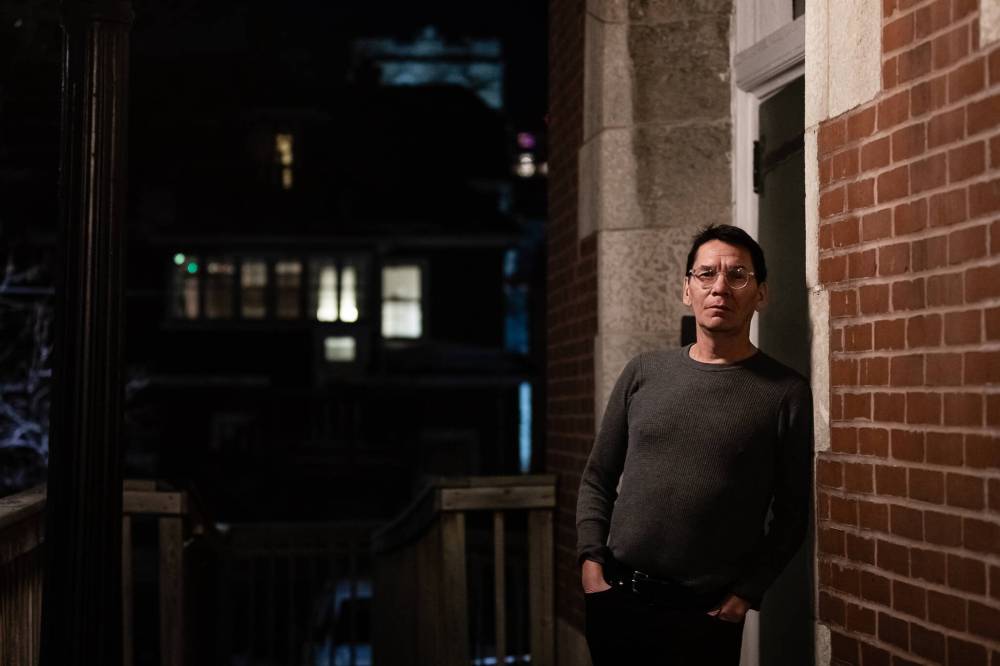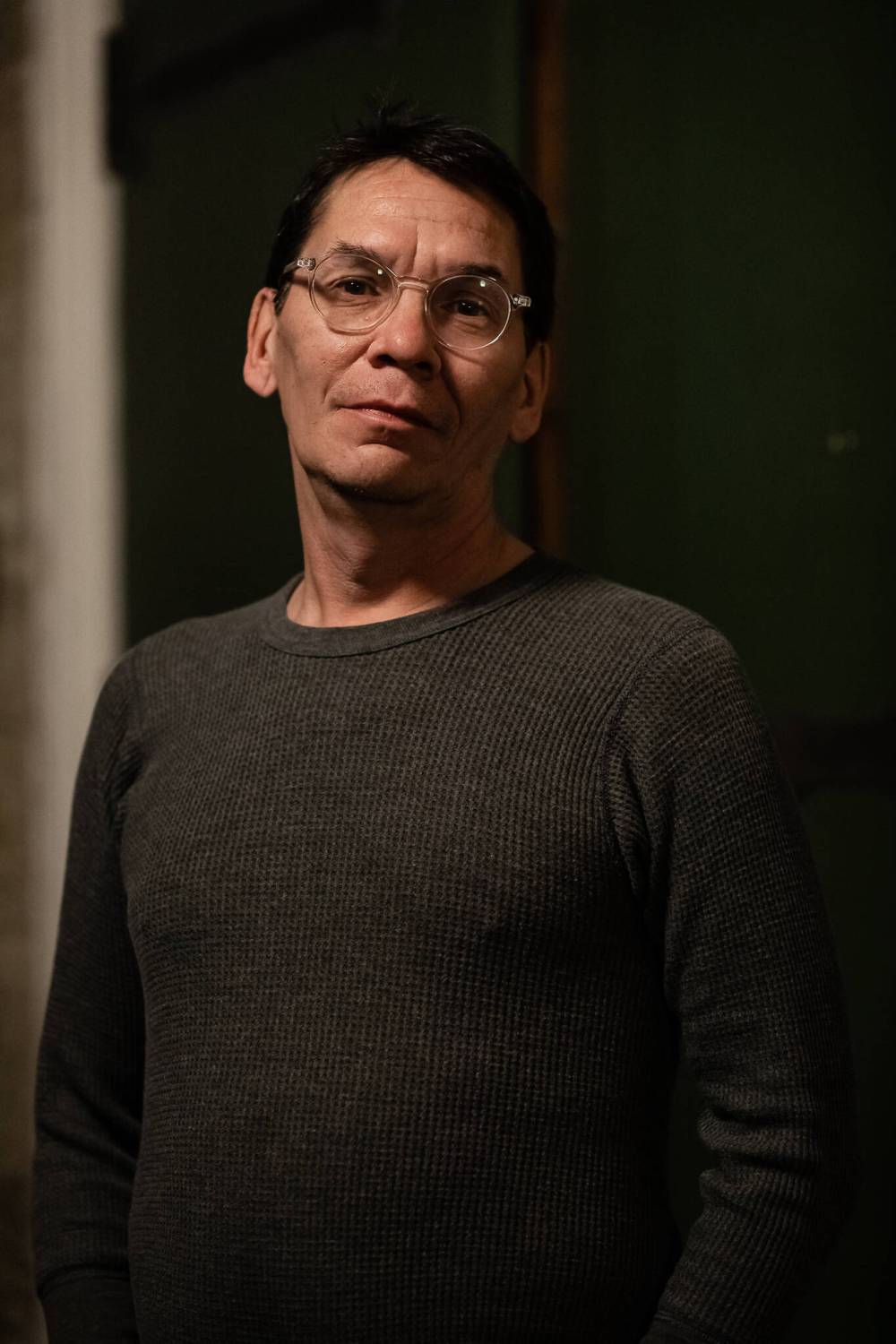At peace in art, at war onstage
True to his pledge to heal through story, Andrew Balfour’s mini-opera is an ode to Indigenous soldier sacrifices
Advertisement
Read this article for free:
or
Already have an account? Log in here »
To continue reading, please subscribe:
Monthly Digital Subscription
$0 for the first 4 weeks*
- Enjoy unlimited reading on winnipegfreepress.com
- Read the E-Edition, our digital replica newspaper
- Access News Break, our award-winning app
- Play interactive puzzles
*No charge for 4 weeks then price increases to the regular rate of $19.00 plus GST every four weeks. Offer available to new and qualified returning subscribers only. Cancel any time.
Monthly Digital Subscription
$4.75/week*
- Enjoy unlimited reading on winnipegfreepress.com
- Read the E-Edition, our digital replica newspaper
- Access News Break, our award-winning app
- Play interactive puzzles
*Billed as $19 plus GST every four weeks. Cancel any time.
To continue reading, please subscribe:
Add Free Press access to your Brandon Sun subscription for only an additional
$1 for the first 4 weeks*
*Your next subscription payment will increase by $1.00 and you will be charged $16.99 plus GST for four weeks. After four weeks, your payment will increase to $23.99 plus GST every four weeks.
Read unlimited articles for free today:
or
Already have an account? Log in here »
Hey there, time traveller!
This article was published 15/02/2023 (1011 days ago), so information in it may no longer be current.
As his star continues its meteoric rise on the national choral scene, award-winning Winnipeg-born composer Andrew Balfour is passionate about keeping it real.
“I feel very fortunate because I know so many of my brothers and sisters are hurting,” the soft-spoken Cree artist and member of Fisher River First Nation reveals over the telephone from the Toronto home he shares with his wife, Indigenous filmmaker Sara Roque.
“If there’s anything I can do to help other people who are off the path, or bring attention to some of those issues Indigenous people are facing today, then that’s the most important thing to me. It’s about storytelling, and bringing those stories to those who are ready to hear them,” he explains.

Kirsten Sawatzky photo
Andrew Balfour’s Notinikew: Going to War is the fourth instalment in his ongoing Truth and Reconciliation series, to be followed soon by The Shaman Project.
Local audiences will be given an opportunity to hear one of those stories as Balfour’s vocal group Dead of Winter (formerly Camerata Nova) presents its next concert on Monday, Feb. 20, 7 p.m. at the Ukrainian Labour Temple located in the North End at 591 Pritchard Ave.
The mixed bill features the artist’s gripping, hopeful Notinikew: Going to War, as the fourth instalment in his ongoing Truth and Reconciliation series, launched in 2017, as well as a selection of his earlier works dating back to 2003, including Omaa Biindig, (Her, Inside) and Trapped in Stone. The program, being led by Mel Braun, rounds out with two crowd-pleasers, Vision Chant and Domine Deus from Missa Brevis.
The 35-minute mini-opera is sung entirely in Cree and features Balfour as (English) narrator, his longtime collaborator Ojibwa Song Keeper Cory Campbell, electro-acoustic cellist Leanne Zacharias, and the Winnipeg Boys Choir co-conducted by Carolyn Boyes and Albert Bergen. Featured soloists will be tenor Nolan Kehler and bass John Anderson.
Originally written to mark the 100th anniversary of the end of the First World War in 2018, the work premiered in Winnipeg that same year, with its most recent performance held in Edmonton with Chronos Vocal Ensemble last November.
“We always think of poppies and flags and the playing of the Last Post when we think about Remembrance Day,” Balfour explains. “But then I started to meet other Indigenous people, who spoke about their grandfather, or great-grandfather who went off to fight a white man’s war, only to return home — if they were lucky — to be shunned by their communities,” he explains. “I started to ask questions, why Indigenous people would make these huge sacrifices only to eventually lose all their rights, including the right to speak their language, and celebrate their own culture.”
Balfour, a ‘60s Scoop survivor born in 1967, credits his supportive settler family for nurturing his musical interests, with his adoptive father, an Anglican minister and trombonist, and adoptive mother a violist. The ’60s Scoops refers to the more than 20,000 First Nations, Métis and Inuit children across Canada who were tragically ripped away from their homes between the 1960s through ‘80s, and placed with mostly non-aboriginal families.
Balfour first cut his choral teeth by singing in an all-male church choir. He further honed his gift for writing polyphonic choral music while also struggling with attention-deficit disorder in school. He dropped out of university after one year, and wound up living on the streets of Winnipeg before serving a four-month sentence at Manitoba’s Milner Ridge Correctional Centre in 1995, as recounted to The Globe and Mail in 2019.
After being welcomed by a number of First Nations and Metis inmates, Balfour embraced his Cree heritage, and dedicated his life’s work to harnessing the power of music to explore, educate, entertain and heal. He founded Camerata Nova in 1996, now re-branded as Dead of Winter with an increasingly Indigenous-themed focus.
He melds the centuries old a cappella one might expect to hear in the highest cathedrals in England, with powerfully raw, visceral works sung in Indigenous tongues and his own heritage into an often surreal combustion of cross-cultural forces.
Braun, who has conducted all of Balfour’s major choral works since joining the group in 2010, recalls first meeting the fledgling artist in the early 1990s. In addition to being his voice instructor at the University of Manitoba (then) School of Music, the elder musician helped his protégé and a half dozen of his friends as they hung out at a local church “doing madrigals and motets,” which became the genesis for Camerata Nova.
“I don’t think anyone else is doing this kind of work,” Braun, also a baritone, says of Balfour’s artistry.
Over the phone, Braun notes Balfour’s compositional style has grown increasingly sophisticated and detailed throughout the years.

Kirsten Sawatzky photo
The ’60s Scoop survivor later embraced his Cree heritage and dedicated his music to ‘storytelling, and bringing those stories to those who are ready to hear them,’ says Andrew Balfour.
“There are tons and tons of people across Canada now catching on to Andrew’s work, and they want to be performing his pieces, which is fantastic. That is how it should be. But it all originated here,” he affirms.
Indeed, Balfour’s soaring career appears to know no bounds. He’s had commissioned works premiered by the Winnipeg, Toronto, Regina, Saskatoon symphony orchestras, the Winnipeg New Music Festival, Tafelmusik, Manitoba Chamber Orchestra, L’Atelier Lyrique de l’Opéra de Montréa, Highlands Opera Workshop, Toronto Mendelssohn Choir, Ensemble Caprice, Groundswell, Winnipeg Jazz Orchestra, the Winnipeg Singers, Kingston Chamber Choir, Luminous Voices and Chronos Vocal Ensemble, among many others.
His life and music is currently the featured cover story of Montreal-based La Scena Musicale, free monthly music magazine, with Dead of Winter travelling to La Belle Province next week to mark its auspicious debut at the biennial Montréal New Music Festival on Feb. 24th, that promises to throw even more windows and doors wide open to him.
Most recently, he’s been nominated for his first Juno award for best classical album of the year (small ensemble), for his album Nagamo (“sings” in Ojibwa), recorded in collaboration with Vancouver-based group musica intima, with whom he’ll be embarking on a cross-Canadian tour next month to work with youth choirs across Turtle Island. That’s another one of his passion projects — educational outreach. He’ll also squeeze in as much time as possible composing the next work for his Truth and Reconciliation series to be premiered next year, The Shaman Project.
However throughout it all, Balfour remains as humble and compassionate as ever. He credits his upbringing in Winnipeg for keeping him firmly rooted, as well as his wide circle of friends, loving family members and fellow artists both within and outside the Indigenous community.
“I was very insulated all those years when I was growing up in Winnipeg,” he reflects. “That really helped me as I was able to focus on what I wanted to do, and worked at building my craft with (then) Camerata Nova, and through my collaborations with Mel Braun and others including the late Vince Fontaine and Corey Campbell. However being here in Toronto has also opened up my horizons through meeting new people, and exploring other opportunities.
“It’s important to keep your feet on the ground and your head in the clouds. It’s very easy to get carried away from everything, so I try to stay grounded as much as possible,” he elaborates.
“I’m married now. That helps a lot, and I still have great support in Winnipeg. I’m very fortunate. It’s not that, ‘Oh, I have a career now,’ but is really about sharing these stories with others. That’s what means the most to me.”
holly.harris@shaw.ca


